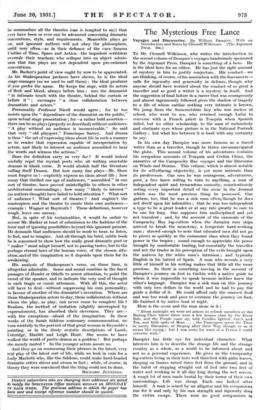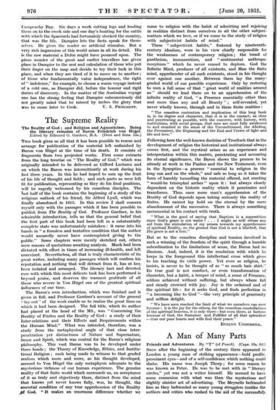The Mysterious Free Lance
To Mr. Clennell- Wilkinson, who writes the introduction to the second volume of Dampier's voyages handsbmely sponsored by the Argonaut Press, Dampier is something of a hero. He is the ideal hero for an editor. He has just the right amount
of mystery in him to justify conjecture. His conduct—we are thinking, of course, of his association with the buccaneers—
calls for ingenuity and generosity in defence, though why anyone should have worried about the conduct of so great a traveller and so good a writer is a mystery in itself. And the suggestion of final failure in a career that was courageously and almost ingenuously followed gives the shadow of tragedy to a life of whose outline nothing very intimate is known: We jump from the Somersetshire boy who was useless at school, who went to sea, who retained enough Latin to converse with a French priest in Tonquin when Spanish failed, but no other scholarship, to the man of melancholy and obstinate eyes whose picture is in the National Portrait Gallery ; but what lies between it is hard with any certainty to say.
In his own day Dampier was more famous as a travel writer than as a traveller, though he thrice circumnavigated the globe. This second volume of his adventures contains his scrupulous accounts of Tonquin and Cochin China, the narrative of the Campeachy Bay voyages and the Discourse on Winds and Storms. This volume, which is almost notable for its self-effacing objectivity, is yet more intimate than its predecessor. One sees he was courageous, adventurous, poor, a free lance willing to turn to anything, a man of independent spirit and tremendous curiosity, conscientiously noting every important detail of the scene in the Journal which was the most precious thing he possessed. One gathers, too, that he was a sick man often, though he does not dwell upon his infirmities ; that he was too independent
a type to be a great leader or at any rate greatly to care to be one for long. One supposes him undisciplined and yet not truculent ; and, by the account of the carousals of the Crunpeachy Bay log-cutters when the Jamaica rum ships arrived to break the monotony, a temperate hard-working man ; shrewd enough to note that educated men did not go to pieces so quickly as the commoner class when they found power in the tropics ; sound enough to appreciate the peace brought by comfortable trading, but essentially the traveller and not the trader in his perception of the evils brought upon the natives by the white man's intrusion ; and typically English in his hatred of Spain. A man who reveals a very little of himself in his writing makes that little all the more precious. So there is something moving in the account of Dampier's journey on foot to Cachin with a native guide to whom it was impossible to speak because neither knew the other's language. Dampier, was a sick man on this journey
with only two dollars in the world and he had to pay the guide a dollar of it. He could afford only the coarsest food and was too weak and poor to continue the journey on foot. He finished it by native boat at night.
Here is the scene and the man alone in it :
" About midnight we were set ashore to refresh ourselves at the Baiting-Place where there were a few houses close by the River Side, and the People came up, with Candles lighted, Araok and Tea, and little spits of Meat . . . the Passengers spent the Time in merry Discourse, or Singing after their Way though to us it seems like crying ; but I was mute for want of a Person I could converse with."
Dampier has little eye for individual character. What interests him is to describe the strange life and the strange country as a whole, as a world to be informed about and not as a personal experience. He gives us the Campeachy log-cutters living in their huts well thatched with palm leaves, sleeping on frames raised three feet from the ground, and in the habit of stepping straight out of bed into two feet of water and working in it all day long during the wet season.
A rough lot of men made brutal by their terror of their own surroundings. Life was cheap. Each one looked after himself. A man is seized by an alligator and his companion§ run for it and only by his own strength and ingenuity does the victim escape. There were no good companions in
Campeachy Bay. Six days a week cutting logs and loading them on to the creek side and one day's hunting for the cattle with which the Spaniards had fortunately stocked the country, that was the life. Dampier lets the facts speak for them- selves. He gives the reader no artificial stimulus. But a very rich impression of this world arises in all its detail. His is the raw material a Defoe might have pounced upon. The pious wonder of the great and earlier travellers has given place in Dampier to the zest and calculation of those who put their finger on the map and decide to try their luck in this place, and when they are tired of it to move on to another ; of those who fundamentally value independence, the right of" indolence," for example, to choose a warm voyage instead of a cold one, as Dampier did, before the honour and rigid duties of discovery. In the matter of the Australian voyage one has the strong feeling that Dampier subconsciously did not greatly mind that he missed by inches the glory that











































 Previous page
Previous page